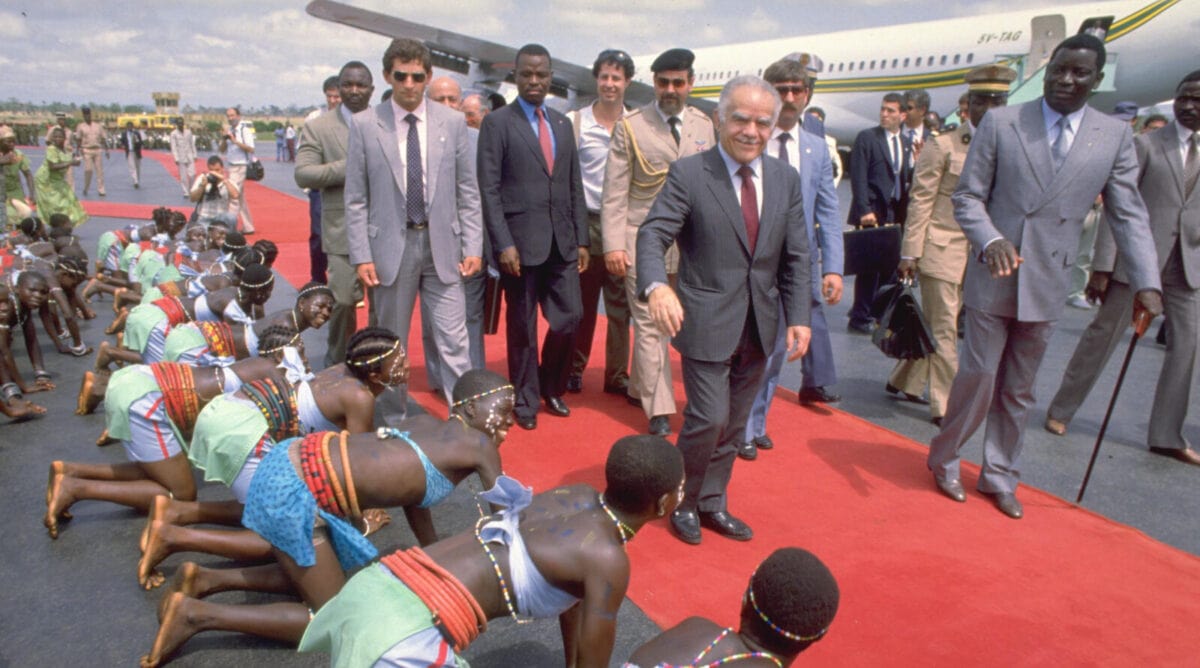South Africa, a former ally of the State of Israel, submitted a petition to the International Court of Justice in The Hague claiming that Israel is committing genocide in Gaza. Uganda denounced the decision of the Ugandan judge in the ICJ who voted against all six provisional measures that were approved, claiming that her position did not reflect this of the country and its citizens regarding the war in Gaza.
Similarly, most other African countries have expressed explicit support for the Palestinian side of the war or remain ambiguous.
In contrast, Togo, the small and poor West African country, remained loyal to Israel. After that on December 12 Togo abstained from voting on a proposed resolution in the UN General Assembly that called for a ceasefire in the war in Gaza without mentioning Hamas. Togo's official website explained: "while campaigning for the end of the conflict between Israel and Hamas, Togo has historically always stood by Israel. In this case, the Jewish state is fighting a terrorist organization, Hamas, and not the Palestinian civilian population."
Earlier, on October 21, Israel's ambassador to Togo, Rony Yedidia Clein, tweeted a photo of her meeting with Togo's president, Faure Gnassingbé, and wrote, "Had very good meetings yesterday and today with President Gnassingbé of Togo. The President expressed his condolences and Togo's full-hearted support for Israel and its right to defend itself."
When President Faure visited Israel in the summer of 2016, Prime Minister Netanyahu posted on Facebook, "Togo is very important to us... I want to express our deep gratitude for Togo's position in international forums. Togo has been consistently friendly to us and stood up not only for Israel, but for the truth, time and time again. We remember our friends and we appreciate them.."
Faure was appointed president in 2005 after his tyrannical father who ruled the country with a strong hand for 38 years, Eyadéma, died of a heart attack while on his way to medical treatment in Israel. During those long years of the father's rule, elections were held in which he was the only real candidate, when his political opponents were murdered or imprisoned and tortured.
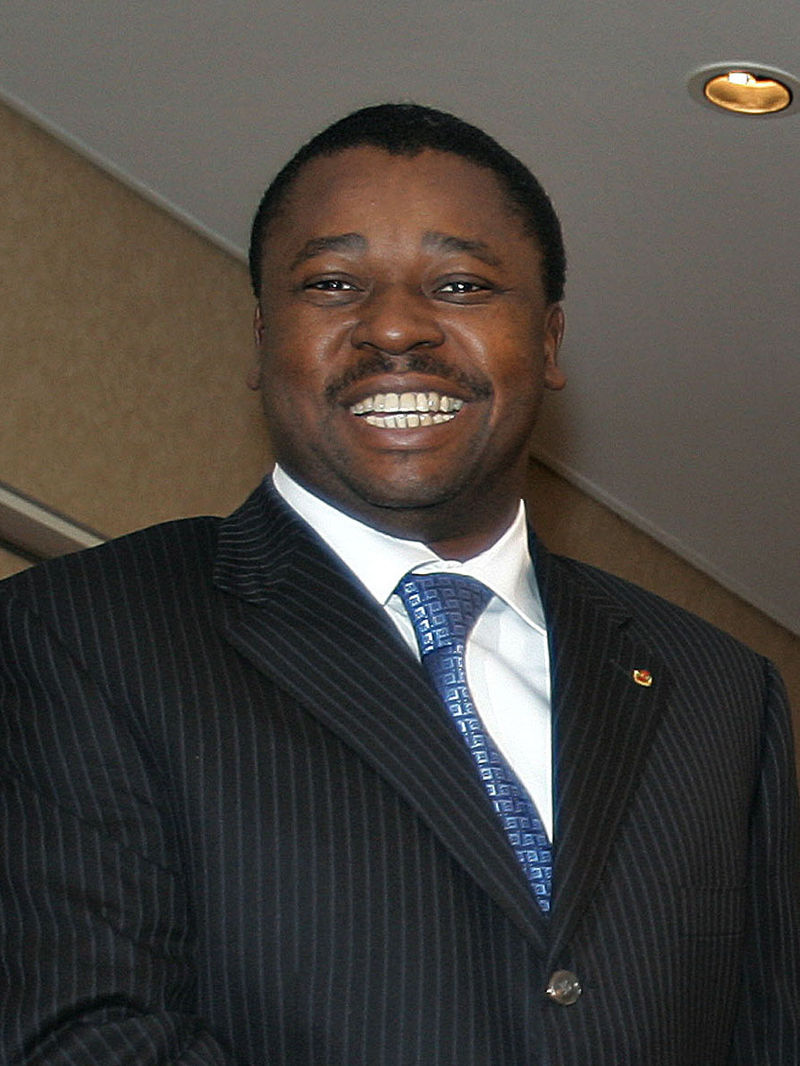
The president of Togo, Faure Gnassingbé (photo: Ricardo Stuckert/PR - Agência Brasil, רשיון CC BY 3.0 br)
The documents of the Ministry of Foreign Affairs in Israel National State Archives that were opened to the public in the last two years, reveal why Togo has become one of the few countries on the African continent that consistently and publicly supports Israel.
Israel's relationship with Togo was outlined during the tenure of Togo's first two presidents, Sylvanus Olympio followed by his brother-in-law Nicolas Grunitzky. Israel opened an embassy in the country as early as 1962, and it was the first in Africa where a Nahal (Fighting Pioneer Youth) framework was established. In a review prepared by the Ministry of Foreign Affairs in March 1964, it was written that relations with President Olympio were good but tightened under the Grunitzky government which showed "willingness to respond to our requests in diplomatic matters".
Both were ousted by Eyadéma. Olympio was shot and killed by Eyadéma on January 1963, and Grunitzky was ousted by him in a military coup in April 1967.
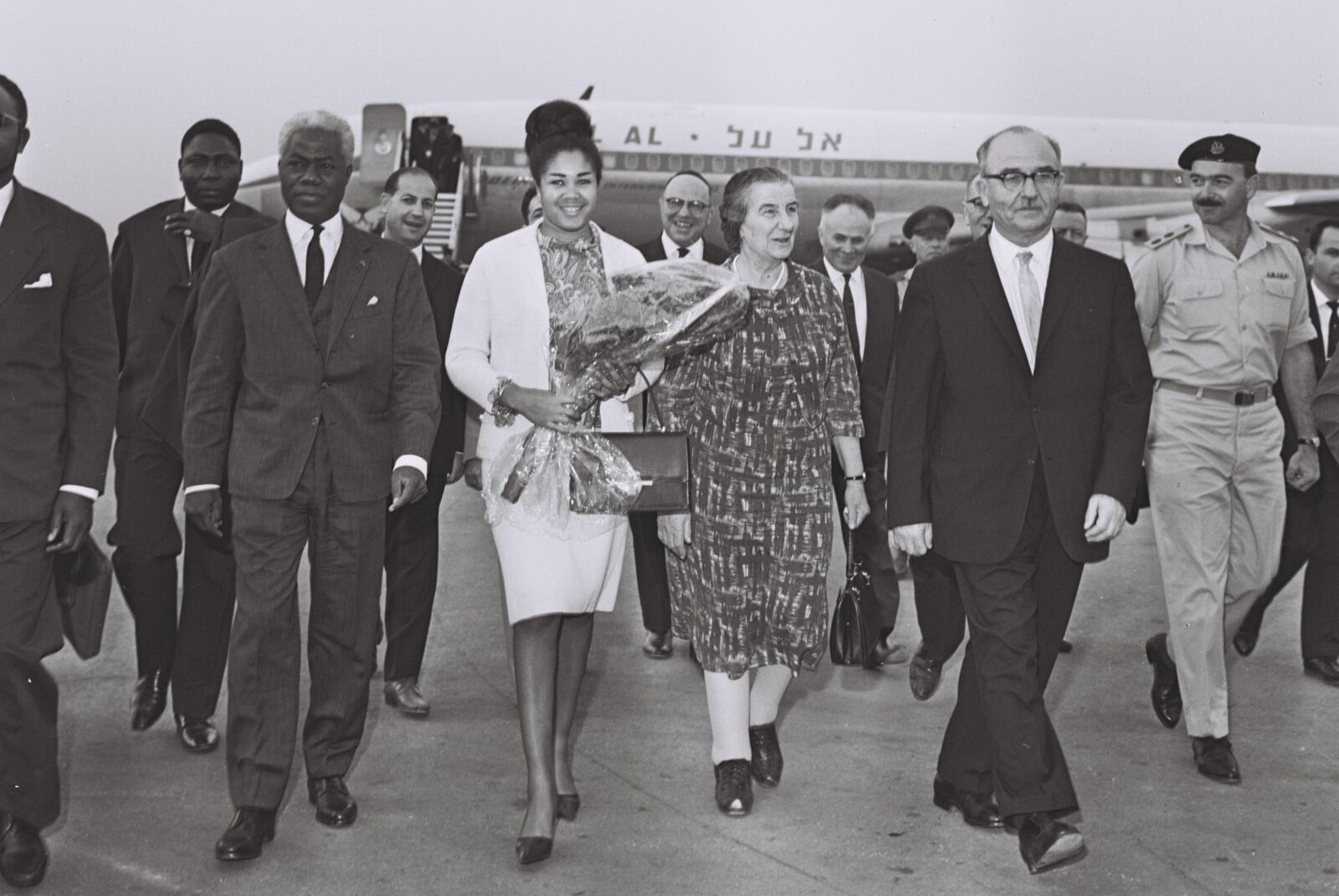
P.M. Levy Eshkol (R), Foreign Min. Mrs. Golda Meir (L), Nicole Grunitzky, Daughter of Togo Pres. And Foreign Min. Georges Apedo Amah (Far Left) Arriving Lod Airport (Photo: Moshe Pridan, GPO)
This is how Eyadéma explained his actions to Israel's ambassador in Lome (the capital of Togo), Moshe Liba, according to a telegram he sent to the director of the Africa Department at the Ministry of Foreign Affairs on April 13, 1967. "He was 27 years old when he decided on a coup against Olympio and put his life on the bullet because before his coup there was only one failed coup in Gabon. He is not thirsty for power and therefore handed the government over to Grunitzky who did his best for four years but was not up to the task."
Eyadéma asked Ambassador Liba for advice on how to continue and whether to keep the reins of government in his hands or hand them back to the civilians. Ambassador Liba replied that he should "act with the utmost moderation and caution and not take rash steps. I expressed unanimity regarding his desire to keep the source of power in his hands while seeking a solution to the situation that has arisen, for the good of the people."
In the midst of the "Six Day War", on June 7, 1967, President Eyadéma met with Ambassador Liba and said that he (Eyadéma) "is our friend in heart and soul and Togo is our sincere friend. Believes in our justice and is confident in our victory." In another meeting between them on June 17, President Eyadéma told Ambassador Liba that he thought "we should stay in the places we conquered". This is according to the telegrams that the ambassador sent to the Ministry of Foreign Affairs in Jerusalem.
In honor of the New Year, in December 1967, Israel sent President Eyadéma an Uzi submachine gun with a special dedication. Since the former colonial power France had exclusivity in all matters of arming Togo's security forces, President Eyadéma had difficulty purchasing weapons from Israel. Instead, Israel received the responsibility for the most sensitive issue for him - the training of his bodyguards.
As a military man who carried out two military coups, he knew very well the dangers inherent in them. His 38 years in office were accompanied by real coup attempts that failed to depose him, as well as coup attempts that he imagined due to paranoia or that he invented to justify increasing internal repression.
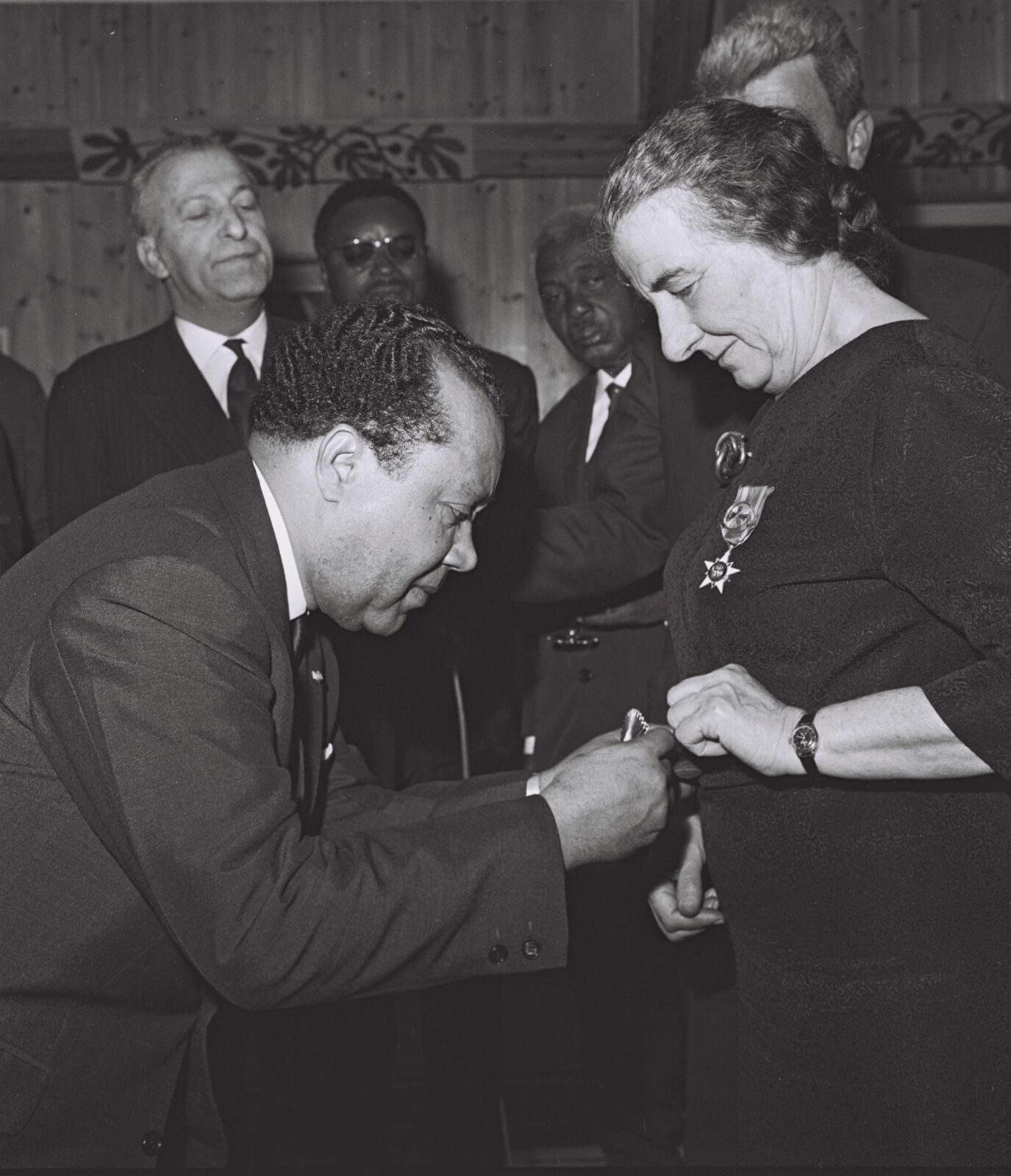
Togo Pres. Nicolas Grunitsky Decorating Foreign Min. Golda Meir With Order of Mono, 1964 (Photo: Moshe Pridan, GPO)
According to a series of telegrams, the first Israeli course was held in Togo between October and November 1969, and 20 of his bodyguards participated. In the telegram sent by the Israeli Embassy in Lome to the Ministry of Foreign Affairs in Jerusalem on November 4, 1969, it was noted that the president thanked the Israeli trainers for their activity and "successful work in training his bodyguards and he asked to pass on his gratitude to those responsible in Israel for allowing the course to take place."
According to the telegrams from the Israeli embassy in Lome, with the knowledge of the French military delegation to Togo, in March 1971 a deal was executed for its purchase of 250 Uzi submachine guns from Israel. That same month, at the request of Israeli Ambassador in Lome, Yoel Sher, the Ministry of Defense sent President Eyadéma uniforms and shoes of paratroopers from the IDF as a gift. Ambassador Sher explained his request in a telegram he sent on March 2 that the gift of IDF uniforms to the president "will make a strong impression on him and he will surely feel himself untouchable when he wears them."
Two months earlier, on January 16, Ambassador Sher reported to the Director of the Africa Department at the Ministry of Foreign Affairs that three prisoners who were arrested after an attempted coup d'état had died, according to the authorities, from "cessation of blood flow". Ambassador Sher explained that this term is "a very literary term for the results of murderous beatings received by the three, along with other prisoners".
Left with no choice, in September 1973 Togo joined most African countries and severed its diplomatic ties with Israel. In a telegram sent on September 22 by the Israeli Ambassador in Lome Yehoshua Rash to Foreign Minister Abba Eban, he reported that the Togolese Foreign Minister Joachim Hunlede explained the situation at their meeting, "We are ready to return and cultivate friendly relations with Israel immediately after things settle down in your area, and for that a complete and rapid evacuation is necessary from the occupied territories. Then our connection will be problem-free." Ambassador Rash replied to him " friends are measured in times of trouble".
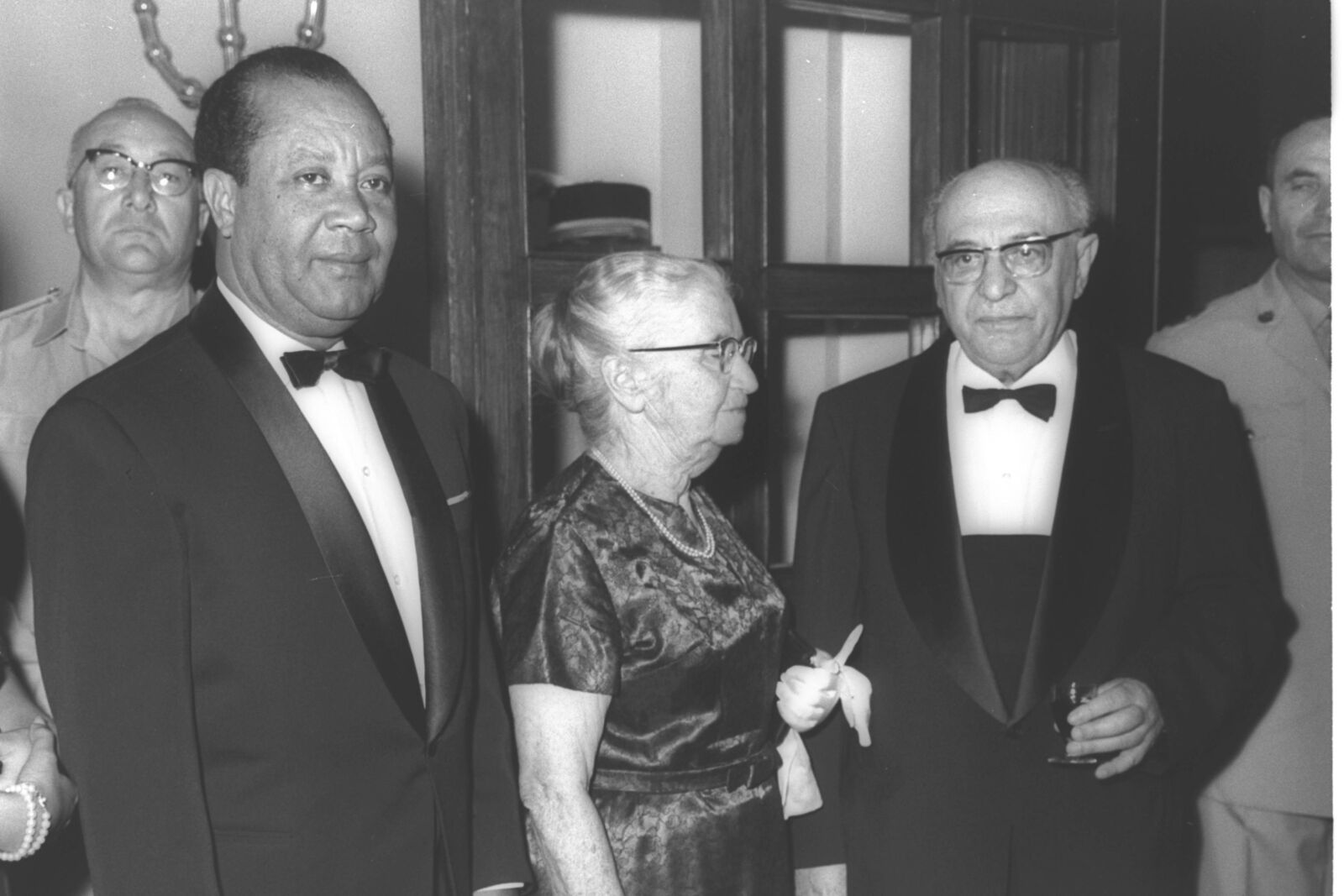
Togo Pres. Nicolas Grunitsky (L) With Pres. And Mrs. Zalman Shazar Before Official Banquet at King David Hotel, Jerusalem (Photo: Moshe Pridan, GPO)
Starting in 1982, Israel conducted negotiations to renew relations with Togo. This despite the fact that Israel knew well that Eyadéma was a tyrant. In a report dated February 7, 1982, Avraham Sharon of the Foreign Ministry's Political Research Division wrote that Togo is run by the military and that President Eyadéma was careful to "cultivate the cult of personality around him in the style of Mobuto in Zaire". Sharon described how Eyadéma is known in Togo as "the nation's guide", "the navigator" and "the father of the new Togo".
During the negotiations, representatives of the Israeli Foreign Ministry held a series of meetings with ministers in the government of Togo, and also with President Eyadéma himself, including in the West German capital of Bonn and at his apartment in Paris. According to a series of telegrams, President Eyadéma made it clear that he was a friend of Israel but feared that the Palestinian armed organizations or the Libyan ruler Muammar Gaddafi would assassinate him.
For example, in a telegram dated February 9, 1982, about the meeting in Bonn, Rahamim Timur, who served in the mid-1960s as ambassador to Lome and now head of Israel international development agency, reported that President Eyadéma told him that "Sadat's personal security was entrusted to the Israelis and the CIA. You and the Americans encouraged Sadat and promised him that Gaddafi would be eliminated and now he has eliminated your most loyal partner Sadat... until you finish him off, we have to live with this person. Therefore, it is better to try to neutralize him and stop him from going on a rampage than to push him away."
In another telegram sent on February 21, Timur reported: "I did not get the impression that the issue of development is at the top of his priorities... Eyadéma's problem is his physical security, that is, his survival... In my estimation, he will be ready for actions only if it can be proven that he can trust Israel in everything to do with his personal security and hence the security of his regime."
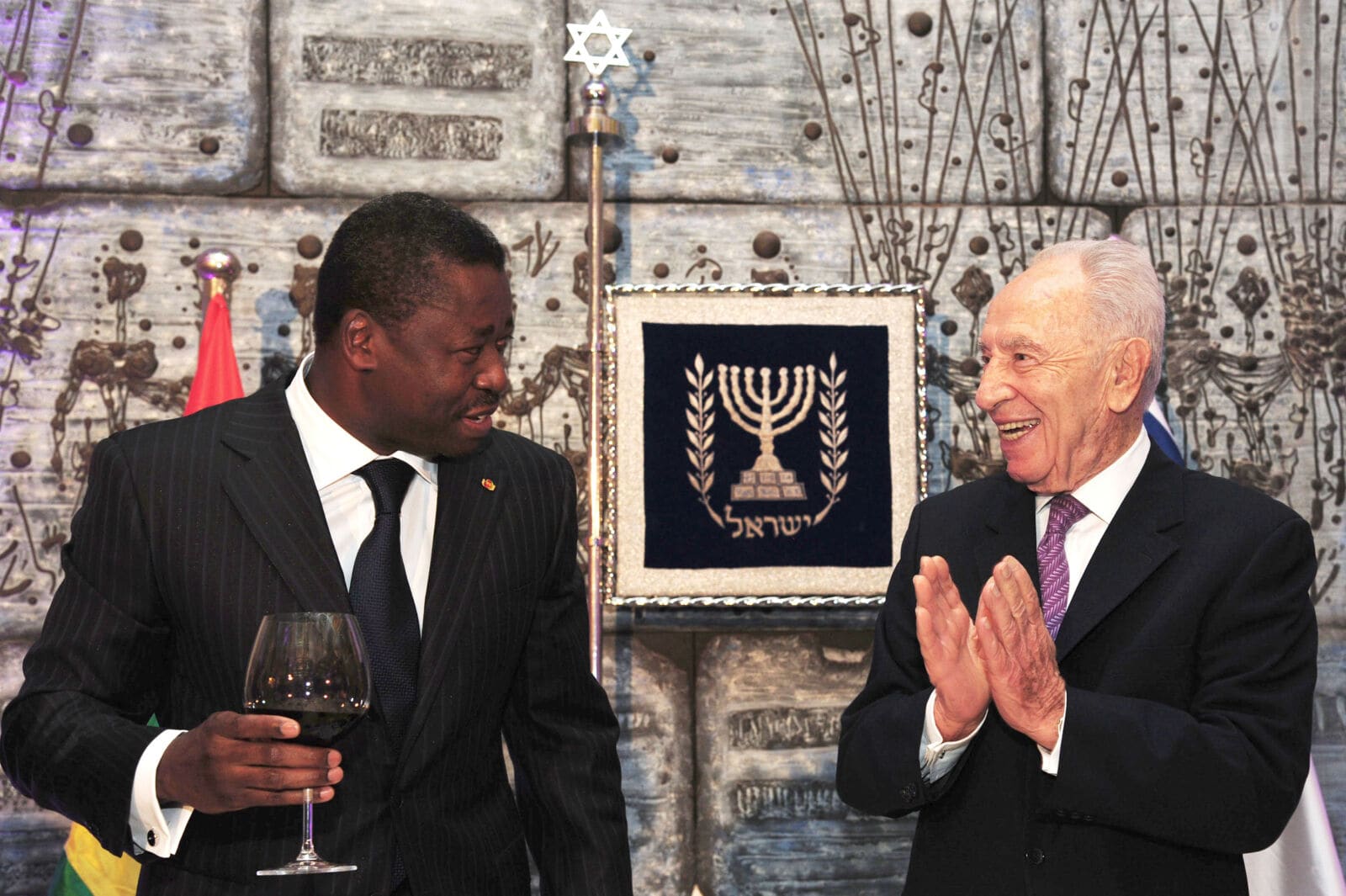
Togo President Faure Gnassingbe's visit to Israel. In the picture, President Gnassingbe makes a toast with President Shimon Peres during a dinner in his honor at the Presidents' Residence in Jerusalem (Photo: Kobi Gideon, GPO)
Timur explained that the president lives in fear of being assassinated and refuses to meet with someone he does not know personally. That is why he agreed to meet with him (Timur) since he knew him as a former ambassador to Lome. It was agreed that Israel would hand over intelligence material on the issues of subversion and Libya and that negotiations will continue regarding the training of the bodyguards. On March 19 Timur together with a Mossad official met with President Eyadéma and handed him the intelligence material. Regarding the training his bodyguards, Israel conditioned this on the renewal of relations, but despite further meetings with the president Eyadéma and his Minister of the Interior no real progress was made for several more years.
Ahead of the "Liberation Day" celebrations held on January 13, 1984, President Eyadéma feared being assassinated. Israel agreed to his proposal to participate in a sort of "test" to demonstrate its capabilities in protecting him. Shin Bet and Mossad personnel were sent to Loma to advise on the security arrangements for the celebrations and carried out their work to Eyadéma's satisfaction. Still, relations have not yet been renewed.
In January 1986, the director of the Africa Department at the Foreign Ministry, Avi Primor, met with President Eyadéma, and offered him assistance in the fight against terrorism against his regime. Eyadéma requested immediate assistance but still did not agree to resume relations.
It seems that the turning point was a significant coup attempt that failed in September 1986. In a telegram sent on September 25, 1986, by the Israeli Embassy in Ghana to the Ministry of Foreign Affairs in Jerusalem, it was stated that a curfew had been imposed throughout the capital Lome and that the authorities had found a huge amount of weapons with the conspirators.
In a telegram sent one month after the failed coup, on October 24, Israel's ambassador to the Ivory Coast, Shimon Agur, wrote to the Ministry of Foreign Affairs in Jerusalem that President Eyadéma had become a nuisance for France in the region and that in light of the Amnesty International report on his human rights violations, "France does not want to appear as a supporter, at any cost, of a tyrannical president."
Agur explained that France does not want to be drawn into military involvement and support "of a regime whose opponents have finally decided its overthrow."
In a telegram sent on April 14, 1987, the head of Israel's mission in neighboring Ghana, Ya'akov Revach, wrote to the Ministry of Foreign Affairs in Jerusalem that in his estimation, "the stability of the government in Togo is artificial, even though it has lasted for so many years." Revach explained that the cult of personality is so strong that the Togolese youth have been brought up in such a way that "they cannot imagine that someone else will lead the country even if Eyadéma dies a natural death one day."
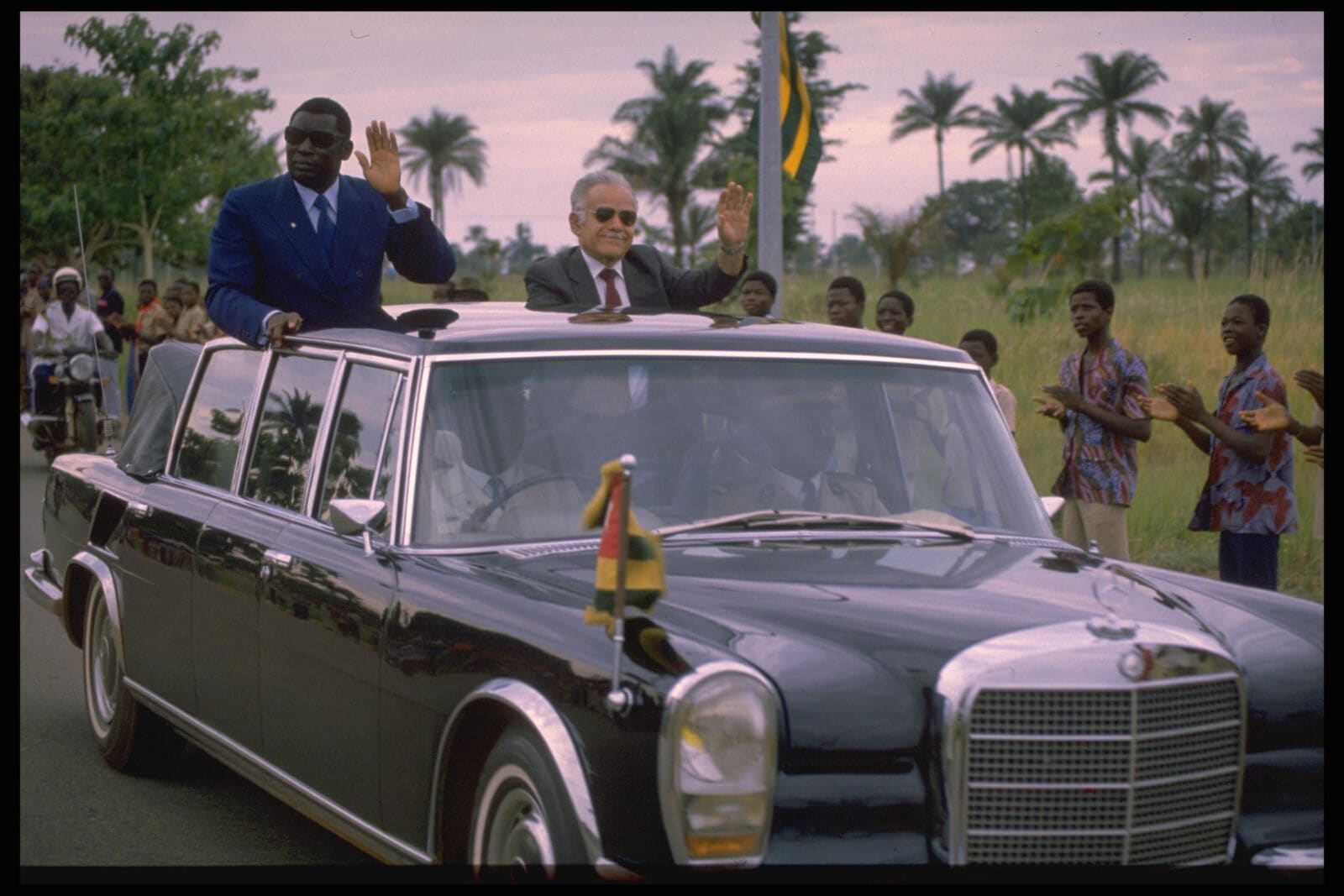
Prime Minister Yitzhak Shamir's Visit to Togo, in Africa. the Pm (R) & the President of Togo Eyadema Gnassingbe Waving From a Passing Car, 1987 (Photo: Nati Hernik, GPO)
Against the background of President Eyadéma's internal and international weakness, on June 9, 1987, Togo announced the renewal of relations with Israel and this led to the official visit of Prime Minister Yitzhak Shamir on June 14 to Lome. At the airport, Shamir was received by young women in traditional clothes who bowed to the ground. Israeli Maariv newspaper reported that the women danced Hora and sang "David the king of Israel".
Shamir wore sunglasses, in what appeared to be a salute to President Eyadéma who was known as someone who never takes off his sunglasses, and together they both waved to the crowds from the open roof of the Mercedes car that drove them on Lome Boulevard. At the core of the renewal of relations and the celebrations was the same old story - on February 8, 1988, the new ambassador in Lome Ya'akov Revach reported that the training program for President Ayadema's bodyguards was progressing.
The latest mention of President Eyadéma in the Foreign Ministry documents that have been opened to the public is from his visit to Israel in July 1998. In a telegram sent by the Director General of the Office of the President of the State, Daniel Maron, to the Deputy Director of the Ministry of Foreign Affairs, Avraham Toledo, he forwarded to him a transcript of a recorded audio greeting from President Eyadéma to Israeli President Ezer Weizmann.
Maron wrote, "It turns out that the president of Togo is an original man... talking about the capital city of Tel Aviv." President Eyadéma's reference to Tel Aviv as the capital of Israel indicates that constant investment is required on the part of Israel's representatives to receive international support for its positions.
Therefore, it is not surprising that the Israeli investment continued even with his heir, Faure. In August 2017, President Faure visited Israel again and wrote in the guest book at the Prime Minister's residence, "I dream of Israel's return to Africa and Africa's return to Israel."
In October, the "Israel-Africa" summit conference that was supposed to take place in Lome, was canceled after huge demonstrations broke out by the opposition that called on the president of Faure to resign from his position. Nevertheless, two months later, on December 21, in a vote in the UN General Assembly in a resolution condemning the President Trump's transfer of the U.S. Embassy to Jerusalem, Togo was among the only nine countries in the world and the only one of all African countries to vote against.
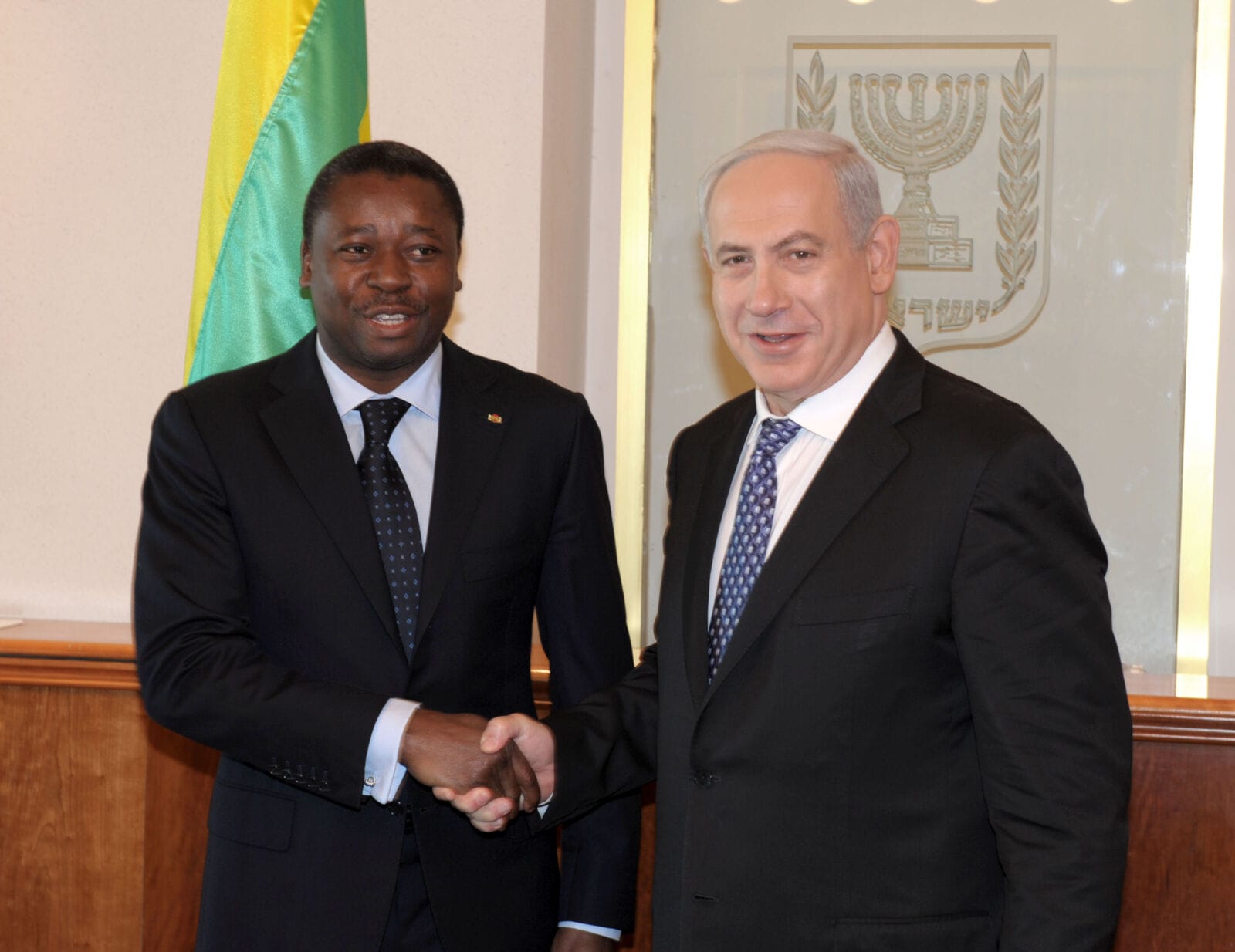
Prime Minister Benjamin Netanyahu (right) meets with Togo President Faure Essozimna Gnassingbe at the Prime Minister's Office in Jerusalem (Photo: Moshe Milner, GPO)
According to the US State Department's reports on the human rights situation in Togo, even under President Faure there were internal repression and political prisoners. In August 2020, the French newspaper "Le Monde" revealed an investigation by the Canadian Citizen-Lab Institute that the "Pegasus" spyware was installed on the cell phones of opponents of President Faure's regime, including clerics, social and political activists.
In addition, as part of the 'Pegasus Project', it was revealed in July 2022 that 300 Togolese numbers appeared in the list of cell phone numbers of potential attack targets by 'Pegasus', including journalists critical of President Faure's regime.
NSO company responded then that it "can't confirm or deny. We are not related to whom our customers - the government, authorized and verified - direct our technology" and clarified that all its customers "are contractually bound to do this only against terrorists and criminals".
Although no evidence was found that the system was purchased by the regime of President Faure, it is difficult to imagine another country in the world that it was important for it to spy on local opposition activists in Togo.
The apple did not fall far from the tree in Togo and neither did Israel's alliance with the Gnassingbé family for 57 years.
Eitay Mack is an Israeli human rights lawyer and activist.
Note: This article first appeared on the Hebrew media platform The Seventh Eye









